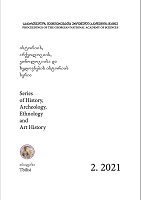საქართველოს მართლმადიდებელი ეკლესიის ანტიდასავლური მოწოდებანი 1924-1930 წლებში
Anti-Western Appeals of the Georgian Orthodox Church in 1924-1930
Author(s): Sergo VardosanidzeSubject(s): Cultural history, History of Church(es), Interwar Period (1920 - 1939), Eastern Orthodoxy, Sociology of Religion, History of Religion
Published by: საქართველოს მეცნიერებათა ეროვნული აკადემიის გამომცემლობა
Keywords: Georgian Orthodox Apostolic Church; Catholic-Patriarch Ambrosi; Catholic-Patriarch Christopher;Pope of Rome; Anglican Church;
Summary/Abstract: In 1921 Georgia was conquered by Bolshevik Russia. In order to blind up the world community, the conquerors, on the spot, set up puppet authorities distinguished for their anti-Georgian activity. In 1921-1922 Georgia, “according to its good-will”, transferred its historic territories to Turkey, Azerbaijan, Ar-menia, Russian Federation; inside the country they created three autonomous units of Abkhazia, Adzharia and South Ossetia. Georgian Orthodox Apostolic Church was deprived of legal status; they began aggressive atheist propaganda and its implementation that was expressed in closure of churches and monas-teries by using administrative measures, persecution of clergy and deprivation of their church property.The Catholic Council of the Georgian Orthodox Church, Catholic-Patri-arch Ambrosi Khelaia spoke out strongly against these illegal, barbaric actions. In 1922 he addressed a special letter to Genoa International Conference de-manding withdrawal of occupation forces from Georgia. The occupation au-thorities arrested Ambrosi Khelaia. It was decided to execute him but vigorous actions of Canterbury Chief Bishop saved the Patriarch. With the help of the inspired by them clergy, who very soon managed to head the Church, Bol-shevik authorities began anti-Western propaganda against the Pope of Rome and Anglican Church who demanded from the European countries to keep the Soviet Government responsible for religious persecution in the country. Even in 1924, at the authorities’ bidding, Bishop Christopher, temporary ruler of the Georgian Church, strongly opposed the Georgian emigrants, calling them “adventurers” and in 1930, already in the rank of Catholicos-Patriarch, he re-proached the Pope of Rome and Church of England for anti-Soviet criticism; he even declared that freedom of will was protected in Georgia and the authorities always considered the position of the Church. Regrettably, this declaration was mainly calculated for outside use and it did not reflect real situation in Georgia. It demonstrated well the hard situation of our nation and Church and its sub-jection to the occupational authorities.
- Issue Year: 2021
- Issue No: 2
- Page Range: 106-116
- Page Count: 11
- Language: Georgian

